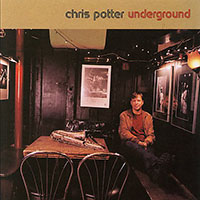Home » Jazz Articles » Album Review » Chris Potter: Underground
Chris Potter: Underground
Until now. With Underground Potter delivers the album that his consistently impressive past efforts only suggested was possible. Combining complex and emotionally wide-reaching compositions with often knotty, yet always accessible grooves, Potter has finally fashioned an album that, more than announcing his potential, delivers it from start to finish with a clear voice.
Lift: Live at the Village Vanguard (Sunnyside, 2004) documented a band that had already been supplanted by a new quartet featuring perennially under-appreciated guitarist Wayne Krantz, ubiquitous keyboardist Craig Taborn and drummer Nate Smith. Guitarist Adam Rogers guests on two tracks here, but for the most part Underground is about this quartet's impressive chemistry, which has been honed over time.
For groups wanting to dispense with a bassist yet retain a broad-spectrum fullness, Taborn is becoming an increasingly popular choice. His work in saxophonist Tim Berne's Science Friction and Hard Cell groups has demonstrated the kind of left-hand/right-hand independence that allows him to be more than a single-minded accompanist. As a soloist he's capable of developing purposeful ideas, while at the same time maintaining staggeringly idiosyncratic riff-based lines with his left—doubling, in fact, with Krantz on the powerful "Big Top," which has the energy of fusion without its excess.
Despite the extended length of many tracks, Underground is surprisingly fat-free. When Smith replaced Billy Kilson in Dave Holland's quintet and big band, it became clear that while he is every bit as capable of complex polyrhythms and irregular meters, he's also more economical in style. On the funky "find the one" challenge of "Next Best Western," his ability to maintain a visceral groove despite moving across ever-shifting bar lines is nothing short of remarkable.
Krantz's inability to reach the larger audiences that contemporaries like Rogers and Kurt Rosenwinkel are enjoying is curious. He's as harmonically modernistic a player as either, but with a grittier rockiness that doesn't preclude greater subtlety on the more ethereal "Celestial Bell."
Potter's skill at fashioning narrative-based solos has been honed, to a large extent, through his eight-year relationship with Holland. But more than merely transferring lessons learned as a performer to his own project, Underground represents Potter's best and most consistent writing to date. And his ability to reinvent Billy Strayhorn's well-worn "Lotus Blossum" into an atmospheric rubato tone poem, perfectly in context with his own more contemporary aesthetic, is further evidence of an increasingly firmly fashioned conceptual voice.
Potter is by no means at his creative peak—or so we can only hope—but with Underground he has made his most personal and successful statement to date.
Track Listing
Next Best Western; Morning Bell; Nudnik; Lotus Blossom; Big Top; The Wheel; Celestial Nomad; Underground; Yesterday.
Personnel
Chris Potter
saxophoneChris Potter: tenor saxophone; Wayne Krantz: guitar; Craig Taborn: Fender Rhodes; Nate Smith: drums; Adam Rogers: guitar (6,9).
Album information
Title: Underground | Year Released: 2006 | Record Label: Sunnyside Records
< Previous
Arthur Doyle Is Still Magick
Next >
Lionel Hampton: Jazz Legend
Comments
Tags
For the Love of Jazz
 All About Jazz has been a pillar of jazz since 1995, championing it as an art form and, more importantly, supporting the musicians who create it. Our enduring commitment has made "AAJ" one of the most culturally important websites of its kind, read by hundreds of thousands of fans, musicians and industry figures every month.
All About Jazz has been a pillar of jazz since 1995, championing it as an art form and, more importantly, supporting the musicians who create it. Our enduring commitment has made "AAJ" one of the most culturally important websites of its kind, read by hundreds of thousands of fans, musicians and industry figures every month.




















